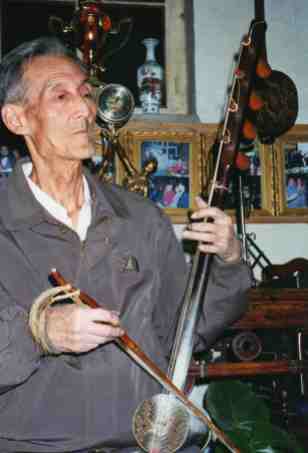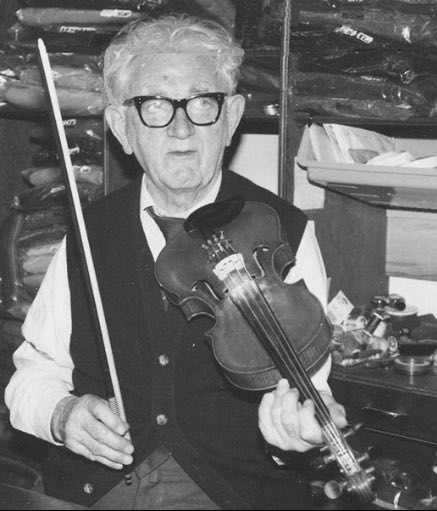
While I was writing with affection and awe on the sheng mouth-organ, I recalled that Ciaran Carson has a similar passion for the tactile minutiae of Irish flutes and their human custodians (Last night’s fun, “Hard to fill”, pp.49–57). Each chapter takes the title of a tune, and (like life, and like jokes!) each tune leads into another.
A few excerpts to give a flavour:
He picks up the foot-joint and prises out the little brass pins which hold the C♯ key in place; he turns it over, and there, under the touch of the key, are the initials “A.L.”, the hidden mark of Alexander Little who spent some time with D’Almaine and later set up shop on his own at 24 Chenies Street (1847–54) and then at 35 Devonshire Street (1854–73).
This is a six-keyed flute of Jamaican cocus-wood, weathered to a rich dark chocolate brown with oxblood striations glinting under the immediate surface. […]
We are in Sam’s workshop at 1 Exchange Place, Belfast. Exchange Place is, in Belfast parlance, an “entry”: a narrow lane between two streets, a backwater or a short-cut, a deviation from the beaten path. Exchange Place is an entry: we talk and breathe in an exhalation, a many-layered scent of shellac, beeswax, raw and boiled linseed oil, tallow, almond oil, aromatic blackwood shavings, nitric acid and ammonia. I believe you can smell the blue steel blades and boxwood handles of the antique tools: gravers, gouges, chisels, pliers, diamond files and flat files, pincers, chasers. You pick one up and feel its oily-sharp edge with grainy specks of sawdust on it.
[…]
And this is not to speak of the unspeakable archaeological layers of things strewn and assembled on every available surface in the workshop: pins, papers, screws, tobacco tins and and coffee jars, thread, waxed paper, empty bobbins, walrus, tusks, billiard balls, sealing-wax and string, envelopes, cigar-boxes, empty glasses, tannin-encrusted teacups, bus tickets, knives, a bottle of Angostura bitters, a drawing-plate, a bicycle repair-kit, two old trade tin trays (Ross’s Mineral Waters and Buckfast Tonic Wine) with rusted pocks in them, bills, invoices, a blue tin of Vaseline, Christmas cards and postcards, a blowtorch, fluxes, solders, coils of silver wire, brass tubing, wine corks, an old cardboard advertisement for Bassett’s Liquorice Allsorts, brass plate, a Swiss Army knife, dust, unaccountable detritus and filings of long-gone operations, a Bo-Peep matchbox which rattles with brass thumb-tacks when you pick it up, washers, drill-bits, oil-cans, tea-pots, files, gimlets, scissors, a copy of the Irish News from last year, a shrivelled chip, Kirby grips, bulldog clips, Jubilee clips and paper-clips, a square damp packet of Saxa salt, Blu-Tack, bits of putty, sealing-wax, a little paper packet of cigarette-lighter flints, a candle stub, a Zippo lighter, cotton-wool, a sticky tin of Tate & Lyle’s Golden Syrup, wisps of steel wool, and the blue glint of methylated spirits shivering in a glass square-shouldered glass-stoppered bottle against a stained, scarred patch of the workbench; on a window-sill, three little tinker-made tin inkwell-shaped receptacles with milled brass screwtops, containing pumice, tripoli and rouge, each bearing the original early Victorian price of three shillings (3/-).
Click here for Pakie Duignan in duet with fiddler Peter Fitzpatrick.
And Last night’s fun is just as wonderful on performance practice. I’ve linked Chinese and Irish musics before; for a change from the usual comparison with silk-and-bamboo (for both social context and heterophonic sound-world), Carson’s recollection of Pakie Duignan reminds me of Daoist guanzi-player Wu Mei:
His way of breathing was a joy: it had economy and grace and power; his management of time was perfect. He had the time to hit whatever note it was that came next, then to extend the breath into the next phrase like a sudden almost-visible extension of the room, as if this phrase had yearned to be united with its predecessor, and now they were together. Then he’d cut the end of that phrase and wander off into the split chink of a twilight zone, momentarily. Normal business would resume some time, but in this instant he had gone down steps he’d never seen till then, that led down to a dark harbour where water clucked against the boats and rocks and a constellation could be seen reflected.
Astounding—go on, read the chapter, and the whole book!
Like Carson’s fantasy on the role of the Irish breakfast in musical life (“Boil the Breakfast early”, pp.15–21), that’s just the kind of loving detail, mutatis mutandis, that we need for China, and Chinese ritual.
As with the syncopated cadential pattern in the hymns of the Li family Daoists, we need to evoke all the practical insider’s detail and the embedding of ritual with daily lives—not just grandiose theory and ancient mysticism. If we’re going to write about music—and ritual—at all, then along with Berliner’s Thinking in jazz, Carson’s book is a paragon. For more, see my series on Irish music!

 Ciaran Carson’s exquisite Last night’s fun has inspired several posts, including
Ciaran Carson’s exquisite Last night’s fun has inspired several posts, including

















